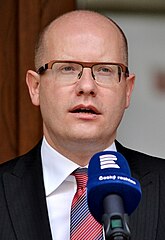Czech Prime Minister
| Prime Minister of the Czech Republic Předseda vlády České republiky |
|
|---|---|

Seal of the Government of the Czech Republic
|
|
|
Government of the Czech Republic Cabinet of the Czech Republic |
|
| Member of | |
| Reports to | Chamber of Deputies |
| Residence | Kramář's Villa |
| Appointer | The President of the Republic |
| Term length | 4 years Renewable indefinitely as long as the incumbent has majority support in the Chamber of Deputies. |
| Inaugural holder | Václav Klaus |
| Formation | 1 January 1993 |
| Website | http://vlada.cz/en/vlada/premier/ |
The Chairman of the Government of the Czech Republic (Czech: Předseda vlády České republiky), normally referred to in English as the Prime Minister, is the head of the Government of the Czech Republic. The Prime Minister and Cabinet (consisting of all the most senior ministers, who are government ministries heads) are collectively accountable for their policies and actions to the Chamber of Deputies. The current Prime Minister, Bohuslav Sobotka, leader of the Czech Social Democratic Party, was appointed by the President on 17 January 2014, and serves as 11th person in this position.
The Prime Minister is appointed by the President and its first priority is to create a Government and appoint other Ministers. To the whole government must be given confidence by the Chamber of Deputies and the Prime Minister stays in office only as long as he or she retains the support of a majority of its members.
The Constitution of the Czech Republic states that Prime Minister organizes activities of the Government and chairs their meetings.
Since the Czech Republic is a parliamentary republic, the Prime Minister and his government are accountable to the Chamber of Deputies of the Parliament. The Czech constitution provides that upon the accession to the office each Prime Minister must gain and thereafter maintain the confidence of the Parliament. As soon as the Prime Minister loses the confidence he or she is forced to resign and the President is obliged to choose a new Prime Minister.
...
Wikipedia

